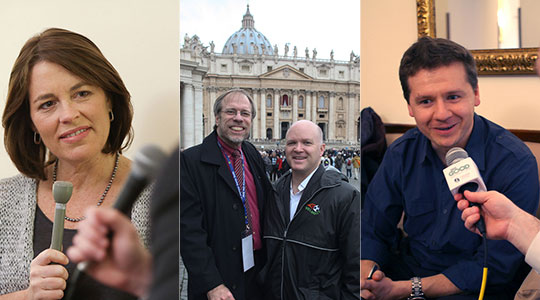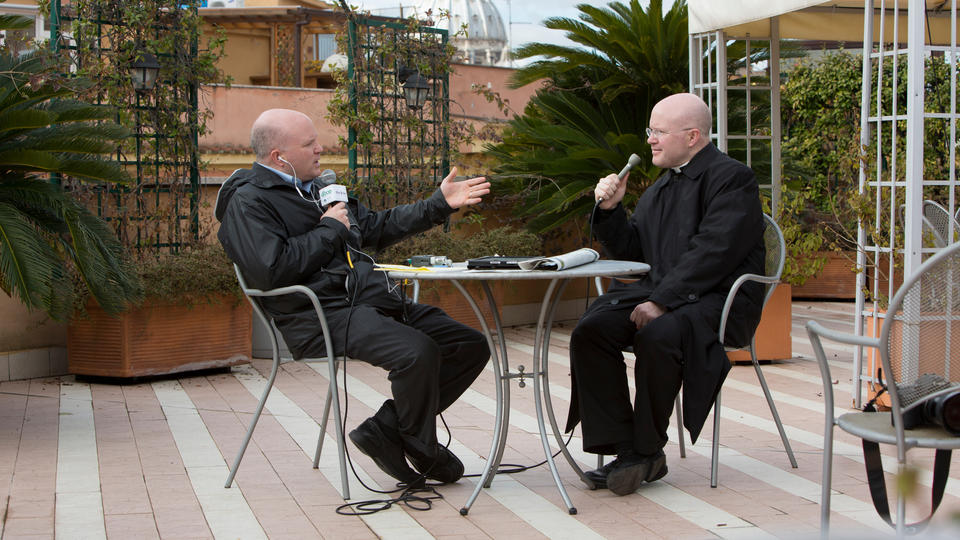Who are we? If we’re Catholic, our faith should mean something in what we do, what we say, and how we say it. That’s no small part of the message of Pope Francis’ media outreach. And it’s at the heart of the mission of Catholic Voices, started in England in 2010
Over the last year or so, I’ve had the joy of working on Catholic Voices USA, an effort to better equip Catholics to explain and defend the faith in the public square — to share the joy and reality of Catholicism. It’s media-focused, but it also uber-practical for Catholics in the public arena of the workplace, the grocery store, the block party, the bar on a Friday night.
This fall, Scot Landry, formerly secretary for Catholic media for the Archdiocese of Boston where he put his business and marketing skills to work, has come aboard as executive director of Catholic Voices USA, bringing to the project exciting new plans and possibilities. As he moves into this new position, we talk a bit about what the Catholic Voices USA project is and why a married father would take a chance on a non-institutional-Church apostolic work.
Q: You had a good job with the occasional trip to Rome for a papal conclave. Why take a chance on Catholic Voices?
A: You are right — I was certainly blessed with a great role at the Archdiocese of Boston, which involved working with Cardinal O’Malley and many others on important and innovative initiatives. Covering the papal conclave as a Bostonian and seeing how so many Italians and others were rooting for Cardinal O’Malley to emerge in white was a surreal and wonderful experience.
I joined Catholic Voices USA because I believe its mission will truly help the Church share its message more effectively. An important part of our vocation as lay people in the Church is to witness and share the Church’s teachings and invite others to experience the same joy that we have known even through the tough times we all encounter in life. Lay Catholics can reach people that the institutional Church and the Church’s own media platforms won’t normally reach. The tools and approaches promoted and taught by Catholic Voices USA have already helped me discuss the Catholic faith more effectively. Through this new role at Catholic Voices, I hope that I can share these methods with other Catholics who are willing to accept this sacred responsibility of proposing our faith to those around us.
Q: Cardinal O’Malley, like Cardinal Dolan and others, is a fan of what Catholic Voices seeks to accomplish. (It was almost a year ago where I first heard Cardinal O’Malley talk about it at a Vatican conference on the Church in the Americas in Rome.) Why? What’s the need we’re trying to meet, as you see it?
A: Cardinal O’Malley and Cardinal Dolan have been enthusiastic advocates for the New Evangelization for many years. They seek to re-propose the truth and joy of living the Catholic faith to current generations. They want the Church’s teachings to be understood even though we all realize that not everyone will agree with us on critical issues.
Catholic Voices USA offers media training to well-catechized Catholics so that they have the confidence to do well in media interviews and debates. We also offer shorter messages in down-to-earth language for explaining why we believe what we believe or why we act in certain ways as we strive to do what Christ has asked of his followers. Those are two of the many reasons I think that Cardinal Dolan and Cardinal O’Malley have encouraged the growth of the Catholic Voices here in the U.S..
Q: We’re both fans of Austen Ivereigh’s How to Defend the Faith without Raising Your Voice, of course. For anyone reading this who is unlikely to have the time to go through a CVUSA training, what’s the magic formula, so to speak, as you see it? What exactly is civil communications?
A: I think it comes down to two essential things: What is it that you are assuming about those who disagree with Church teaching? What are you are trying to accomplish when you defend the faith?
The Catholic Voices approach encourages that we look for the positive intention behind any criticism of a Church teaching. That can be a starting point for a conversation. As Christians, we truly care about those who disagree with us and so we need to listen to them and understand where they are coming from before we respond. I think this is why the world has so appreciated the first six months of Pope Francis’ leadership. He is reaching out to those that don’t fully share the Church teaching because it is clear that he loves them. He is modeling the love of Christ. We believe that God created each person who disagrees with us out of love. If Christ loves those who disagree with us on issues, then we must too.
Secondly, the Catholic Voices approach, articulated in Ivereigh’s excellent book, encourages us to “shed light, not heat,” to be positive and compassionate in our tone, to strive to “witness, not win,” and to acknowledge that “people won’t remember what you said as much as how you made them feel.” In other words, as lay ambassador of the Catholic Church we need to be authentic messengers of the faith; on “first impression” how we act toward those that criticize the Church is very important. If we, as representatives of our faith, “walk the talk,” people might be interested in exploring more about the Catholic way of life.
The Catholic Voices approach recognizes that people are more moved and persuaded by people they come to respect than by objective facts and logic. Catholic Voices strives to do both well — convey a concise, compelling, and clear explanation of Church teaching in a positive and compassionate manner.
Q: You host a show on Catholic radio in Boston called The Good Catholic Life. What is a good Catholic life? Are people living it? That’s sorta what Catholic Voices is, isn’t it, letting people know it’s possible!
A: I would think every engaged Catholic would answer what a “Good Catholic Life” is slightly differently. For me, a good Catholic life begins with the deep recognition that we are each a unique creation of a loving God, who is with us at every moment of our lives, who has offered Himself as a sacrifice for our shortcomings and sins, and wants to enter into a profound and personal friendship with each of us. With that recognition comes a gratitude for all we’ve been freely given by God in this life and also the motivation to love God more and more each day by caring for and loving our neighbors — everyone we encounter as we live our lives.
A “Good Catholic Life” isn’t necessarily easy to live but it is a truly wonderful and integrated life — one that we hope more and more people will freely choose to live.
You are right that Catholic Voices in so many ways is inviting and explaining why adopting a Catholic way of life will lead to deeper and everlasting happiness, peace and joy even as we go through life’s inevitable ups and downs. A key contribution of Catholic Voices will be explaining why the Church teaches certain things and helping people overcome any misconceptions.
Q: What do you think it is about Pope Francis that is catching people’s attention, that seems so welcoming? And what difference do you hope it makes here in the U.S. in particular?
A: I think the world’s reaction to Pope Francis is similar to what it was for Blessed Mother Teresa of Calcutta. People see love in action with both of them — particularly love for the marginalized and those on the fringes of society. This is the love, I believe, that people expect to see from Christians. It is radical. It is inspiring. It is authentic. To see Pope Francis embrace Dominic Gondreau, an eight-year-old boy with cerebral palsy, in Saint Peter’s Square on Easter Sunday was a compelling way for Pope Francis to state affirmatively that Christ lives! Christ’s love tangibly lives on Easter Sunday — and everyday — in the love of his followers, from the newest baptized baby to the Vicar of Christ on earth.
Also, I think Pope Francis’ messages are being shared so much more across the world because his homilies, messages, and actions are expressed in simple, down-to-earth ways instead of in more theological language. That makes them easier to report on, discuss, and react to. This is exactly what Catholic Voices also tries to do.
Finally, Francis’ leadership is showing that he knows the Church needs reform. This goes much deeper than the reforms of the institutions and organizational charts of the Roman Curia. This is about our belief, attitudes, and ways of living our Catholic faith today. He is modeling for us a Church that returns to the essentials of being authentic witnesses of Christ’s life, death and resurrection in the way that we care for all those around us and love them in tangible ways.
His call for us to overcome our desensitization toward the harsh plight of immigrants is one example of this teaching. This is certainly affecting the efforts of Catholics in the United States to pass immigration reform that respects the dignity of the men, women, and children that come to this country and for solutions that keep families together.
Q: Many people’s eyes may glaze over when they hear the phrase “New Evangelization” that many in Churchy circles keep using. What is it, really and truly? Is it really new? Why are some institutional Church folks so excited about it?
A: We do have a knack for big words in the Catholic Church! For many people today the word “evangelization” is a word that is not fully understood and one that can be an obstacle for some Catholics in responding to Christ’s universal call to each of us to share our faith. I’ve spent time each day on The Good Catholic Life radio program defining terms for those new to the Church and to the show. The goal at Catholic Voices USA is to be accessible, always. Words should not be obstacles, but invitations.
When the Church speaks of the new evangelization, it is asking everyone in the Church to share the Good News of Christ’s saving love that we have received with those whose faith has grown cold. In many ways it is a re-sharing, a re-proposal of our Catholic faith to those who have drifted away from the faith as adults or those that believe that they wouldn’t be welcomed in our Church. What is “new” is that the Church is asking us to carry out this sacred duty of sharing our faith with a new energy and in new ways.
At Catholic Voices USA, we are seeking to help lay Catholics be more effective at discussing the Catholic faith through broadcast media, new media, and social media. This technology gives each of us an opportunity to impact someone literally half-the-world away.
Q: Is Catholic faith a game-changer in the life of a man today? How is it even relevant for in the busy Northeast Corridor?
A: The Catholic faith is a game-changer is the life of men and women today, as it has always been, and always will be. That’s different, however, from the question of whether cultural elites might consider any faith relevant in an increasingly secular society.
Our Catholic faith makes a difference in my life every day as a Catholic man. Recently, I watched how two Catholic men close to me died after receiving terminal diagnoses. One had a deep and abiding faith in what Christ has taught us about death and heaven. His death was filled with peace, joy and hope. The other wasn’t sure about anything the Church teaches and I think, because of those deep doubts, struggled so much and only received peace at the very end. The faith, or lack of it, made a difference at the end of life in these Catholic men.
Many of the Catholic men I encounter are fathers with school-age children. We are doing our very best to raise our kids to be happy adults — a key part of this is to raise them to explore vocations, particularly the vocation to marriage. As Catholics, we believe that marriage is more than a civil contract, more than even a sacrament — we say it’s a vocation. That means that for many adults, their vocation — their path to heaven — will be living their sacramental marriage vows to the best of their ability. Yet we live in a culture that forms us, particularly our young people, to separate sex from marriage, to objectify women through pornography and suggestive advertising, to blur the lines of natural and healthy differences between men and women and so much more. These all make it so much harder to prepare well for marriage and to live it out faithfully. I am much happier in my life because I have accepted with gratitude the Church’s teachings on these issues and I pray that my children, all young people and all of society will choose to embrace these life-affirming teachings.
Q: There are tough issues in the news — in our lives — that the Catholic Church has some unpopular things to say about. What gives you confidence and hope that the Church can remain engaged in the public square?
A: We must always remain engaged in the discussion because Christ tells us in Sacred Scripture and through the Sacred Tradition of the Church how we are to act and that He will be with us always — as we fight for the voiceless and the marginalized and as we advocate for laws and policies that will affirm human dignity, strengthen families and allow a civilization of love to flourish.
I’m concerned, as an American today, that there is a growing intolerance toward the views of people of faith. There are those who seek to mute in aggressive ways our contributions and expressions of the common good from various faith traditions, including Catholic Christianity. Catholic Voices has already been involved in educating Catholic lay people on the importance of religious liberty and we will continue doing so I’m sure for many years. This is a fundamental issue and we need so many more people to stand up for religious freedom.
Q: What are the benefits of having a twin brother (Fr. Roger Landry) who is a diocesan priest and who is active in sharing the family through the media?
A: I consider being born an identical twin one of God’s biggest blessings to me. It was great growing up as an identical twin and it continues to impact my life in so many positive ways.
We were of course baptized on the same day but in many ways Roger “caught” Catholicism before I did. His humble and holy witness of living the Catholic faith to the best of his ability helped me also to “catch” the faith and seek to share it with others that I encounter as a Catholic layman.
I learn new things each week about Catholicism from his homilies, articles, and retreats that he publishes on CatholicPreaching.com. I’ve often used it to prep for my radio show and know it could be a vital resource for those reading this interview, for daily supplemental spiritual reading and catechesis.
Q: You’ve been involved in some of Catholic Voices USA’s big training events over the last year and a half. What have you appreciated the most about what you witnessed and participated in?
A: The most important things I’ve seen are the universal appreciation of the participants for the Catholic Voices approach to discussing controversial issues and the impact that a little media training can make on a well-catechized lay person who wants to effectively discuss the Catholic faith. After I first participated as a faculty member for training in the nation’s capital, I worked hard to bring a training weekend to Boston, which we held this past April. Now, in my role with Catholic Voices, I will try to bring this training across the U.S. I’m excited to begin.
Q: What did you make of the pope’s extensive, headline-making interview, published in the Jesuit America magazine, last week?
A: Pope Francis’ interview, and the reaction to it, are both extremely noteworthy. For anyone that wants to understand the mind and the priorities of Pope Francis, I encourage them to spend 30 minutes and read his entire interview. It is moving. In it, he emphasizes that the main message of the Church (that Jesus Christ came to save you) has often been lost because there has been focus on other issues. Those issues are important, but not as important as Christ’s saving love for each of us. He wants us to clearly understand that the Church is a hospital for sinners, not a museum for saints.
Christianity is so much more than a moral code — but the moral code is important and we see it as a gift of God to help us live a good and happy life.
Going forward, we hope that Catholic Voices USA can help provide the context and big picture on statements like this from Pope Francis, to shed light and context on what he is striving to communicate to the world as the successor of Saint Peter.














